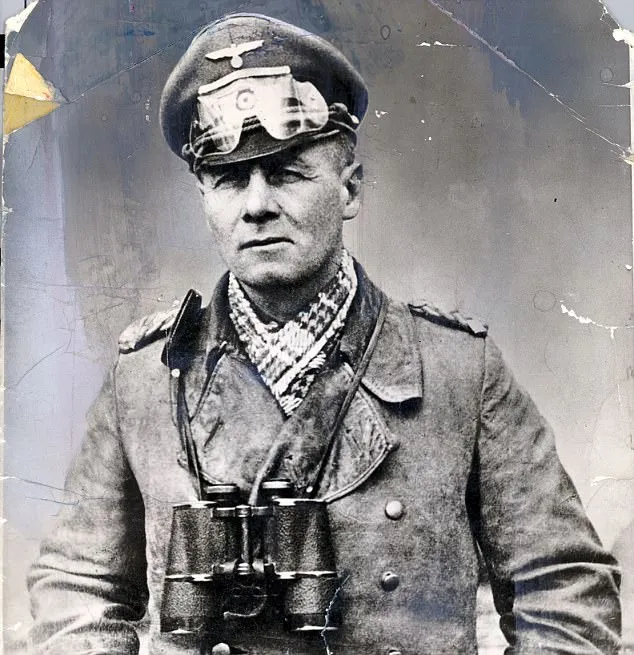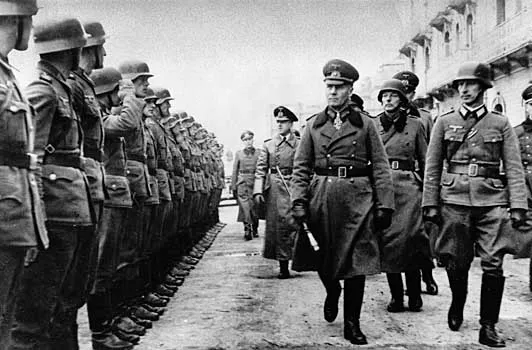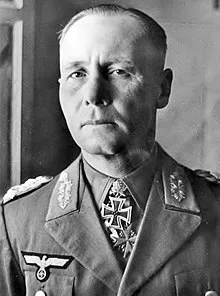"Be an example to your men, in your duty and in private life. Never spare yourself, and let the troops see that you don't in your endurance of fatigue and privation. Always be tactful and well mannered and teach your subordinates to do the same. Avoid excessive sharpness or harshness of voice, which usually indicates the man has shortcomings of his own to hide." - Irwin Rommel
I have posted a couple of blogs about the siege of Tobruk in WWII recently. My thought initially was that it would be a brief glimpse into the significant Australian involvement, an homage I suppose, considering my intense patriotism and Australian-ness, respect for those who serve in the military and Australian history itself.
After doing two parts, which I posted last week as a combined post, introducing the siege at Tobruk, desert war in general and the initial capturing of Tobruk by the 6th Division, I realised a series about the Tobruk campaign would not be as simple talking only about the Australian aspect and involvement.
Read part one and two of Tobruk here
The siege and Desert War as a whole was a conflagration that involved many players and elements and to enlighten my reader to the whole picture would be impossible. Well, maybe not impossible per se, but difficult through lack of time.
Having said that I have decided to write about some of the other components and people of the war in Africa to balance out my series. This post is on the German commander Erwin Rommel, the man who pushed so hard against the Australian's who had just taken Tobruk, finally won it back, then lost it again.
The Desert Fox

Erwin Rommel, (1891 –1944) Field Marshall src
Rommel was a decorated officer from the First World War and even at that early stage his brilliance for military tactics shone though. Between the World Wars he held various military roles demonstrating his brilliant tactics, and natural leadership - Interestingly, he was known to avoid the use of force as often as possible.
He penned the book Infantry Attacks based on his actions on the Italian Front and in the early part of the second war was instrumental in the invasion of France in command of the 7th Panzer Division, or Ghost Division as it came to be known. It consisted of over two hundred tanks, two rifle regiments, and three other battalions: Motorcycle, engineer and anti-tank. That's a lot of men and equipment, movement and logistics to command however Rommel was a natural leader and always got the best of men and equipment.
Panzer Division tactics involved highly mobile infantry and armour (tanks) that would focus on, and punch through, the enemy's defences at one single point then continue deep into the enemy zone creating havoc whilst supporting tanks and infantry fanned out back at the breach to subdue enemy forces along their front line. It was a brutally effective tactic.
Rommel used this tactic in the Desert War to great effect also.
Erwin Rommel arrived in Africa to bring order to a campaign that was not going well.
The Australian's had just defeated the Italian's and taken Tobruk (see last post) and the Germans wanted it back due to the strategic value of its port. The General arrived in Tripoli on the 12th February 1941 and immediately set to work devising a plan to reclaim Tobruk and gain the upper-hand in the Desert War.
In Africa Rommel commanded the 15th and 21st Panzer Divisions and associated other units and at the time was only a General, not Field Marshall.
He went into action about a month after arriving with the 5th Light Division (later renamed the 21st Division) and a couple of Italian Divisions capturing El Brega, Benghazi and Cyrenaica.
This first action highlighted what would become his ultimate downfall however; Supply lines.
Hundreds of tanks and trucks required a lot of fuel and the men required food, water and ammunition, all of which was in short supply. Fuel, food and water all had to come from Europe and make its way to the front by road and keeping his army fed, fuelled and armed became a full-time job for Rommel and his officers - A distraction that added to the pressure of waging war against the allies. With the allied special forces (SAS) nipping at his heels, the supply lines, Rommel was constantly frustrated.
Rommel eyes Tobruk
Considering his supply shortfalls and the fragility of a long supply-chain Rommel eyed Tobruk with eager intent. Its port would ensure supplies were kept up and the rest of his desert war could proceed without fear of the lack of fuel, ammunition, food or water supplies.
On the 14th of April he launched an attack on the town’s defences, the Australian's defending it, but that first action failed. From that point Rommel and General Morshead, the defending commander, attacked and counter-attacked trading savage blows until the end of the siege in November.
Unfortunately for Rommel his favoured tactic of fast and mobile attacks combining men and armour were not possible, or that successful, as his tanks would move much faster than his fuel supply was able to. This resulted in his tanks often being rendered useless though lack of fuel making them vulnerable.
Both sides fought hard and with brilliance in attack, counter attack and defence. It wasn't an even fight, tanks against men, but fortune swung back and forth depending on fuel-availability, and sheer hard work on both sides in attack of defence; All in terribly hot and dry conditions.
One of Rommel’s great advantages, and sometimes downfalls, was his Panzer Tanks.
Until his arrival in Africa the British Matilda tank had dominated the battlefield but they were simply no match for the most excellent Panzer tank; Its superior firepower would open up a Matilda like a can of sardines and it’s own armour was near on impenetrable!
Added to the Panzer's awesome firepower and battlefield superiority was Rommels’s 88mm anti-aircraft cannon which were also very effective tank killers. Their accuracy and range made short work of Allied armour as the 88 could accurately destroy a tank from two kilometers away! It was a stroke of genius that he turned the 88's into anti-tank guns rather than the anti-aircraft guns they were designed to be...They were brutally effective take killers and the Allied forces were right to fear them and their crews.
During the campaign in Africa Rommel gained the nickname of Desert Fox given to him by the Allied commanders due to his outstanding tactics, ingenuity and ability to get the best from his men and equipment. It showed the respect the Allies had for their adversary.
Among his own men Rommel was universally liked by troops and officers alike, and his reputation for chivalry throughout the campaign was wildly known and acclaimed on both sides. He always ensured his troops treated prisoners with a great deal of respect and courtesy; They were his Honourable adversaries and were treated accordingly. The war in Africa had become known as the war in without hate and Rommel himself perpetuated that concept.
Rommel's Desert War actions
Mersa El Brega, Siege of Tobruk, Operation Crusader, Battle of Gazala and capture of Tobruk, First Battle of El Alamein, Battle of Alam El Halfa, Second Battle of El Alamein, Retreat across Africa, Tunisia.
Erwin Rommel returned to Germany in March 1943 and command was handed over to General Hans-Jürgen von Arnim. The Field Marshall was never to return to Africa and his beloved Afrika Korps.

Rommel inspecting troops src
Rommel won and lost in Africa depending on the day and the fortunes he was dealt. He did so with the same intelligence, focus and professionalism he had applied to his entire military career. He was a true officer and a gentleman.
After he returned from the desert war, he took those same principles to his next command: Opposing the Allies in Normandy in June 1944. This was 5 months before his death, and the end, (or beginning), of his legend, depending on whom one speaks to.
Plot to kill Hitler
Field Marshal Erwin Rommel was implicated in a July 1944 plot to assassinate Adolf Hitler and was captured.
Due to the Field Marshall's status as a national hero Hitler was keen to dispose of Rommel quickly and quietly. After his arrest he was given the option of a trial ending in humiliation and execution or suicide with assurances his family would not be harmed. He chose the latter. His final moments are well-documented.
*Collected in a car by SS Officers Burgdorf and Maisel, he was driven away after a curt, but loving, farewell to his wife and son Manfred. A little out of town the car was stopped and the two SS Officers left the vehicle with Rommel inside. Five minutes later they returned to the vehicle and Field Marshall Erwin Rommel was slumped over, dead. The cyanide capsule Burgdorf had given him had done its job. Ten minutes later Rommel's wife received a phone call informing her of his death.
On the 14th of October 1944 Erwin Rommel crushed that cyanide pill in his mouth and died ending what had been a brilliant military career carried out with distinction.
It was announced by the Nazi's that he had died from complications over injuries sustained when his staff car was strafed in Normandy; He was given a State Funeral so as not to raise questions, and his body had been cremated to avoid any future complications, and investigations.
Erwin Rommel was a fierce adversary on the battlefield, a superb battlefield commander, loving husband and father, a gentleman and a scholar. He had honour and was thought of with great respect, even by opposing commanders. He is still thought of in this way to this day.

He will be remembered as good or bad depending upon who is doing the remembering and contention continues to this day on whether he was indeed a hero or villain. src
To the Aussie, and Allied, troops defending Tobruk against him, and in other actions throughout the desert war, he was regarded with mixed emotions; It was widely accepted that he was a chivalrous and respectful commander who fought with brilliant tactics and brutal efficiency but also one who would treat prisoners of war with extreme respect and care. He was a feared adversary, respected on and off the battlefield and had loved his family so much he went to his death willingly to protect them. Interestingly his family were left alone as promised, and his son Manfred Rommel became a German politician, the Mayor of Stuttgart from 1974 - 1996. He was also a great friend to George Patton IV and David Montgomery who were the sons of two of his fathers greatest World War Two adversaries.
I hope you have enjoyed this small piece on Erwin Rommel; No story about Tobruk or the Desert War in Africa could be told without mentioning him. I have given only a brief insight of the man and over my next couple of posts may mention him again but for my next post the focus will shift back to the Aussies.
Design and create your ideal life, don't live it by default - Tomorrow isn't promised.
Be well
This post is not intended to be pro or anti anything or anyone. It is a story about an historical figure who played a part in one of Australia's military conflicts. There were heroes and villains on both sides of the conflict, there always is. I retell these stories as I believe it is important to remember the past and in the retelling I believe it is important to talk about both sides. Men fought and died no matter which uniform they wore, many against their will and they should be remembered. - Lest we forget -